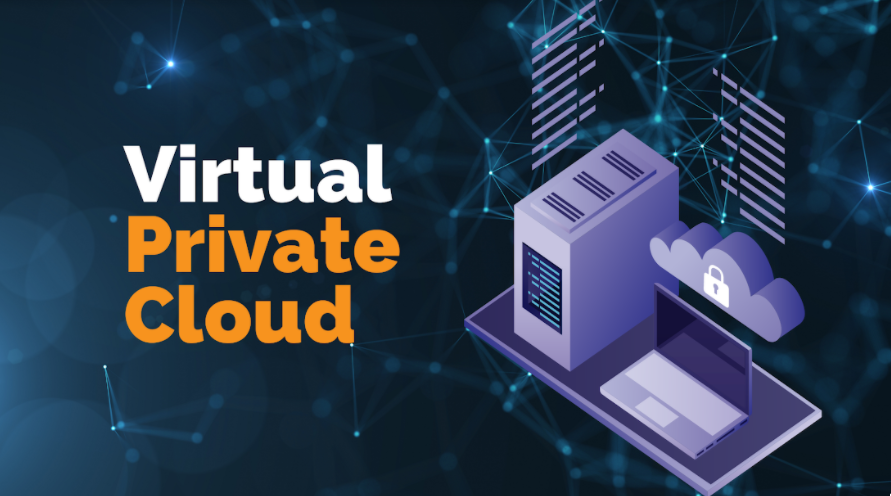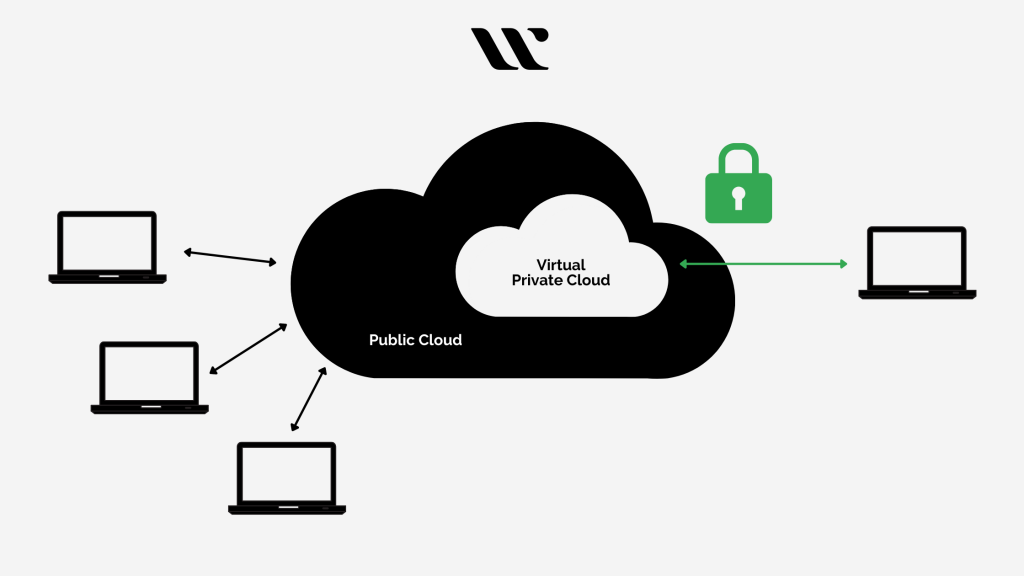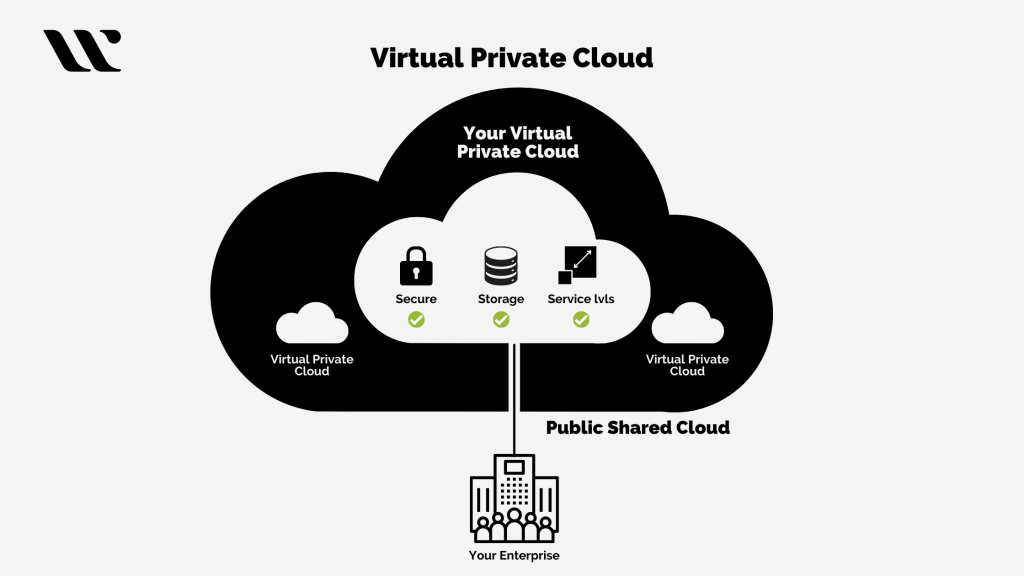Virtual Private Cloud gives the users a private environment suitable for cloud computing that is contained within a public cloud. To be precise, it is a completely isolated cloud that is hosted within a public cloud. A virtual private cloud can be used for storing data, running codes, hosting websites, and everything else that you intend to do in any usual private cloud.
The role of virtual private cloud is to combine the public cloud computing aspects such as convenience & scalability with the data isolation aspects of private cloud computing. As the public cloud computing environment is highly crowded, you will still get that private space within it to carry out your operations.
In this guide, you will get clear information on what Virtual Private Cloud is and why there is so much fuss about it amongst business owners.
Definition of Public & Private Cloud
Before you can inch towards gathering information on a virtual private cloud, it is pretty much important for you to understand the fundamental definition of public and private cloud. Let’s start with the public cloud; it is a shared infrastructure within the cloud upon which multiple customers have accessibility. Some of the common public cloud providers are AWS, Azure, Google Cloud, and others.
Read more on The Advantages of Using a Private Cloud Over a Virtual Private Cloud (VPC)
Private Cloud is considerably a single-tenant environment that is offered to specifically one single organization. It is better known as a cloud environment within the public cloud space. For instance, if you own a virtual private cloud environment, no one or no organization is going to share it. Therefore, this is picking up immense popularity among enterprises or organizations.
Process of Isolation of a Virtual Private Cloud within a Public Cloud
As you have understood the fundamental definition of both public and private cloud, here is a brief explanation of how a Virtual Private Cloud is isolated within a Public cloud environment. There are certain technologies that are involved with the ideology of Virtual Private Cloud that helps isolate a virtual private cloud from the public cloud. The technologies include subnets, VPN, and VLAN.
Subnets are defined to be a collection of a vast range of IP addresses within the network. These IPs are reserved with the intention to ensure that they are not available or accessible by all the users within that cloud network. It is the technology that divides some parts of the network to keep it for the sake of private use. The users will pick their respective subnets to create their virtual private cloud with these private IPs. These are not publicly visible and are not accessible as well.
VLAN is a virtual local area network, and just like Subnet, it is one of the possible technologies that can be used for partitioning the existing cloud network. But, with the use of VLAN, the partitions are occurred in respective layers as per the OSI model. OSI (Open Systems Interconnection) is a model that allows the users to enable different communication systems to interact with one another using some pre-configured or standard protocols.
Virtual Private Network or VPN is a technology that is popularly used for implementing encryption as the tool for creating a separate private network within a public network. The VPN traffic passes through public internet infrastructures such as routers or switches, but the traffic isn’t visible to anyone as it is all shuffled or scrambled.
Check out Whizlabs Cloud Certification Training Courses. Learn and get certified!
With these technologies, a virtual private cloud is destined to have its own VLAN and Subnet, which is to be accessed only by the respective user. You can store your computing resources within it, and no public cloud user will have the authority to access them without your consent. The customer with the Virtual Private Cloud needs to use a VPN for connecting with their private cloud. It is essential for ensuring that that data passion in & out of VPC remains invisible to the other users within the public cloud.
Features of Virtual Private Cloud
By now, you have understood that a virtual private cloud is an important service implementation that can help your organization store and utilize data in the best way possible. The top providers for the same in the present era are Amazon Virtual Private Cloud and Azure Virtual Private Cloud. There are many others as well, but these two names are winning over the market with their impeccable service and features.
But, before you can hop on to search for the efficacies of each of these VPC providers, it is important for you to know its features in general. The features of Virtual Private Cloud include:
- High Availability- Virtual Private Cloud is meant to have high tolerance ability with impeccable availability zone architectures. With it, you can ensure that your workloads and applications are highly available at any point in time.
- Enhanced Security- Virtual Private Cloud is kept isolated within the public network, for which the applications or data are secured from sharing space with other customers or users of that same public cloud. The resources or workloads embedded within the VPC are completely within your control. Moreover, you can also decide upon the accessibility aspects to decide upon who can access it and who cannot.
- Proficiently Agile- You have the power to control the overall size of your virtual network. Apart from that, you can deploy the cloud resources or workloads at the times when your business demands for it, irrespective of any location or time barriers. The resources are also scalable in real-time.
- Cost-Effective- The cost-effectiveness of using Virtual Private Cloud within the public cloud environment is truly commendable. The business owners are relying upon it for some evident reasons such as no hardware cost, less labor cost, no upfront cost, and others.
The Architecture of Virtual Private Cloud
With the implementation of virtual private cloud, it is now easy for businesses to deploy their cloud resources within an isolated network where the accessibility is restricted for other uninvolved users within the cloud environment.
There are three logical instances or cloud resources that are provided to the customers upon integrating Virtual Private Cloud. These are as follows:
- Compute- The users are provided with vCPUs that consist of a defined memory and specified computing power.
- Storage- The customers who have taken Virtual Private Cloud are allocated with a specified quota of block storage for each account to ensure security for all VPC customers. You are not limited to just the available storage space but can buy more to meet your organizational needs. The storage recommendations should be based upon the type of workloads you are working with.
- Networking- You get the ability to deploy virtual versions of several networking attributes into your VPC account for restricting or permitting access to resources. Some of such networking functions are load balancers, routers, and public gateways.
Best Performing AWS Free Tests
| Sl No | Certification | Questions | Rating | Link to the Test |
|---|---|---|---|---|
| 1 | AWS Certified Cloud Practitioner | 55 Practice Questions | 4.72 (29235) | Try Now |
| 2 | AWS Certified Solutions Architect Associate | 20 Practice Questions | 4.72 (93418) | Try Now |
| 3 | AWS Certified Developer Associate | 25 Practice Questions | 4.67 (29669) | Try Now |
| 4 | AWS Certified SysOps Administrator Associate | 20 Practice Questions | 4.69 (17143) | Try Now |
| 5 | AWS Certified Solutions Architect Professional | 15 Practice Questions | 4.71 (20740) | Try Now |
| 6 | AWS Certified DevOps Engineer Professional | 15 Practice Questions | 4.56 (10809) | Try Now |
| 7 | AWS Certified Advanced Networking – Specialty | 15 Practice Questions | 4.41 (3894) | Try Now |
| 8 | AWS Certified Security - Specialty | 15 Practice Questions | 4.49 (8650) | Try Now |
| 9 | AWS Certified Alexa Skill Builder - Specialty | 15 Practice Questions | 4.58 (972) | Try Now |
| 10 | AWS Certified Machine Learning - Specialty | 15 Practice Questions | 4.81 (3157) | Try Now |
| 11 | AWS Certified Database - Specialty | 15 Practice Questions | 4.67 (1005) | Try Now |
| 12 | AWS Certified Data Analytics - Specialty | 20 Practice Questions | 4.55 (2000) | Try Now |
Perks of Using Virtual Private Cloud
Lastly, this guide will sum up by giving you an insight into several benefits of virtual private cloud that are the core USPs for it. The benefits of using VPC include:
- Flexible Business Growth
The cloud resources or logical instances, storage, networking, and servers, as stated above, are meant to be deployed dynamically. Therefore, the customers can seek easy adaptation to the upcoming business changes at a faster pace to seek immense growth.
- Satisfied Customers
With the high availability aspects of Virtual Private Cloud, the digital businesses will preferably experience high uptime of around 100% and will give out better experience to your business customers. As a result, they would put in more loyalty and trust within your brand.
- Reduced Risk of Losing Data
With the implementation of high-level security with the involvement of security groups and access control lists, there is no risk of losing any data stored within the Virtual Private Cloud. The security aspects within a VPC are considered at the subnet level to ensure the customers’ complete reliability.
- Achieve Key Business Goals
As the cost of creating and managing a VPC is less, you will eventually save a lot of expenses in terms of your IT infrastructure. Hence, the businesses get the potential to focus on other core business aspects and achieve diverse goals to enhance their successful outcomes.
- Improved Performance
The websites and applications hosted by the cloud are meant to perform better in comparison to the websites or applications being hosted by the local servers.
Final Verdict
With all of these collective details upon Virtual Private Cloud, you can conclude that its efficacy is inevitable. You just need to pick the provider you wish to go with, such as Amazon or Azure Virtual Private Cloud. After that setting it up is quite easy within their respective management consoles.
Check out 40+ Best Performing Free Tests from Whizlabs today!
Picking the right service provider is the key to avail the maximum productivity out of VPC. Different providers have implemented diverse features and facilities within their services to help users enjoy maximum productivity upon integration. For more information, you can check on the VPC offering of respective cloud service providers.
- Top 20 Questions To Prepare For Certified Kubernetes Administrator Exam - August 16, 2024
- 10 AWS Services to Master for the AWS Developer Associate Exam - August 14, 2024
- Exam Tips for AWS Machine Learning Specialty Certification - August 7, 2024
- Best 15+ AWS Developer Associate hands-on labs in 2024 - July 24, 2024
- Containers vs Virtual Machines: Differences You Should Know - June 24, 2024
- Databricks Launched World’s Most Capable Large Language Model (LLM) - April 26, 2024
- What are the storage options available in Microsoft Azure? - March 14, 2024
- User’s Guide to Getting Started with Google Kubernetes Engine - March 1, 2024


